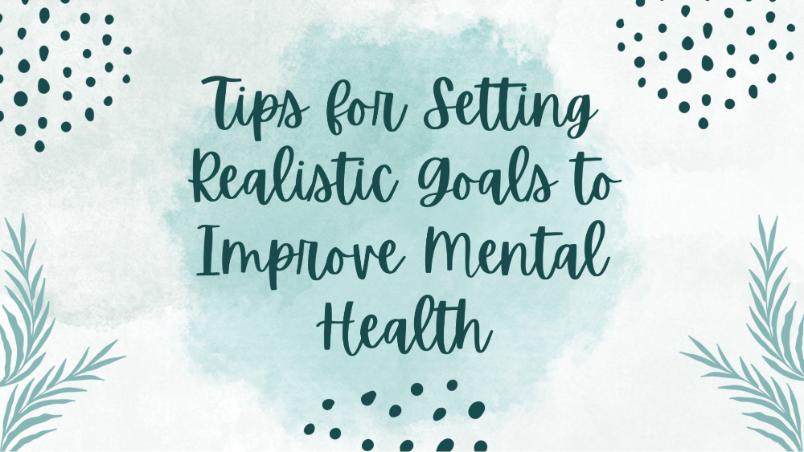While many understand the broad value of setting goals, few appreciate their profound impact on mental health. Studies have shown that individuals who set goals demonstrate higher levels of self-motivation, self-esteem, independence, and confidence. But what makes these goals so transformative?
Let’s dive deeper into how a clear sense of purpose not only directs but also energizes your mental health journey.
Understanding the Importance of Goal Setting in Mental Health
Having goals gives you a sense of purpose and something meaningful to strive for. People who set goals tend to have higher self-motivation, self-esteem, independence, and confidence compared to those who do not set goals. These benefits, including increased self-efficacy and improved emotional regulation, underscore the importance of intentional goal-setting practices for mental health.
Recognizing the benefits of goal setting is just the beginning. The real challenge and opportunity lie in crafting goals that are both inspiring and achievable. According to a study published in the National Library of Medicine, while 77% of people maintain their New Year’s resolutions for one week, only 19% are still committed after two years. This stark contrast highlights the need for a structured approach to goal formulation. Let’s explore how the SMART framework can turn your aspirations into attainable objectives.
How to Formulate Realistic Goals
Self-awareness and honest self-assessment are critical first steps. Too often, people set goals based on external pressures instead of internal drives. Take time for introspection to identify your personal strengths, values, lifestyle factors, and potential roadblocks.
For those struggling with alcohol addiction, which can significantly impact mental health, it may be necessary to seek professional guidance at a reputable alcohol rehab near me as part of this self-evaluation process.
Patience and dedication over time, rather than grand gestures or quick fixes, are key to achieving realistic mental health goals. This self-knowledge will inform an approach tailored to your unique situation.
The SMART criteria (Specific, Measurable, Achievable, Relevant, Time-bound) provide a structured blueprint for translating broad intentions into tangible objectives:
- Specific: Define clear, concise goals. “Practice mindfulness” is vague, while “Meditate for 10 minutes each morning” is specific.
- Measurable: Quantify your goals to track progress objectively. For example, “Rate my mood on a scale of 1-10 each evening.”
- Achievable: Ensure goals align with your capabilities and resources. Small daily steps can lead to transformative change over time.
- Relevant: Connect goals to your core values and long-term vision for improved mental health and overall well-being.
- Time-bound: Assign realistic deadlines to maintain focus and accountability. “Practice daily gratitude” is open-ended, while “Write five gratitudes each morning for 30 days” is bounded.
Now that we’ve established how to set SMART goals, the next step is integrating these goals into your daily life. It’s not just about setting goals—it’s about living them. For instance, incorporating just 10 minutes of mindfulness meditation into your morning routine has been shown to significantly reduce stress. Let’s examine practical strategies to weave your mental health goals into the fabric of your everyday existence.
Integrating Goals into Daily Life
Sustainable growth often stems from incremental habits repeated consistently over time. Structuring your goals as minor additions to existing routines can make them feel less daunting:
| Goal Integration Strategy | Tips/Resources |
| Journal 5 gratitudes each morning | The Five Minute Journal app |
| 20-minute lunchtime walk | Map a route, invite a coworker, listen to podcasts |
| Write 3 daily positives before bed | Nightstand notebook or notes app |
| 10-minute morning meditation | Calm app, YouTube guided meditations |
| Replace snacks with fresh fruits/nuts | Prep portions in advance, desk bowl |
- Journal five reasons you’re grateful each morning to build a foundation for long-term growth.
- Go for a 20-minute walk during your lunch break to break up the day with healthy movement.
- Unwind each evening by writing down three positives that occurred during the day.
The key is to seamlessly blend these practices into your regular schedule in a realistic and manageable way. Overloading your day is likely to lead to frustration and burnout.
Overcoming Common Obstacles in Mental Health Goal Setting
Dealing with Setbacks
Temporary failure is inevitable and often provides valuable lessons. Acknowledge that it takes patience and diligence to accomplish meaningful goals. When you encounter a setback:
- Reflect, don’t reprimand. Rather than berating yourself, examine the reasons behind the slip-up through a compassionate lens. This mindset shift prevents minor lapses from becoming larger downward spirals.
- Adjust, don’t abandon. Revisit your SMART plan with an open mind. You may need to modify the timeline, reframe the goal itself or adjust your approach. Rigid thinking limits your ability to adapt and persevere.
- Recommit with resilience. Setbacks test your commitment, but overcoming them breeds resilience. Treat each instance as an opportunity to fortify your dedication to personal growth.
Avoiding Burnout
Mental fatigue is a common barrier. While setting unrealistic goals may feel motivating initially, it often leads to discouragement when those lofty expectations cannot be met. To prevent burnout:
- Break large goals into smaller steps. Achieving a long-term vision is more feasible when you outline the incremental milestones along the way. Celebrate each of these “mini-wins” to maintain momentum.
- Prioritize quality over quantity. Attempting to juggle too many goals disperses your energy in multiple directions. Focus on a few core priorities that align with your deepest values.
- Embrace moderation. Even the most dedicated self-improvement requires periodic breaks for rest and rejuvenation. Schedule buffer periods to reset the mind and body.
Overcoming initial obstacles is a significant achievement, yet the true challenge lies in sustaining these efforts over the long term. Engaging with community resources and continuously adapting your goals can provide the support and flexibility needed to persist. By recognizing small victories and rewarding yourself, you can maintain motivation. Let’s discuss how to cultivate a resilient commitment to your mental health goals.
Maintaining Long-Term Commitment
Community and Social Support
Having a supportive network can be catalytic—both motivating you through difficult periods and keeping you accountable to your evolving goals. This may include:
- Sharing progress with close friends or family who understand your aspirations and can celebrate milestones with you.
- Joining local peer support groups connected by common mental health experiences and objectives.
- Consulting professional help by speaking with a therapist or counselor who can provide expert guidance.
Surrounding yourself with a positive sphere enhances perseverance and provides reassurance when self-doubt arises.
Continuous Learning and Adaptation
Growth is an ongoing, lifelong process—not a finite journey. Embrace this mindset by continuously re-evaluating and updating your goals as circumstances change.
- Celebrate small wins regularly. Pausing to acknowledge micro-victories boosts motivation for bigger accomplishments ahead.
- Solicit external feedback. Trusted peers can often identify blind spots in your progress that you may have overlooked.
- Remain open to making adjustments as needed. If a particular approach isn’t working, have the flexibility to recalibrate your strategy as needed.
With this adaptable outlook, you transform stagnation into an ever-evolving cycle of self-improvement and mental fortitude.
While we’ve covered a comprehensive approach to setting and achieving mental health goals, you may still have specific questions about navigating this complex process. Let’s address some of the most frequently asked questions that might arise as you embark on your mental health improvement journey.
Key Takeaways
Setting goals is a powerful catalyst for mental health improvement, but only when approached realistically. By formulating SMART objectives tailored to your lifestyle, integrating them seamlessly into routines, and cultivating resilience through setbacks, you can make lasting positive impacts.
The path will not be linear, but each small progress deserves celebration. Embrace the journey as a lifelong learning experience, continuously evolving your goals alongside your ever-changing circumstances. With dedication, compassion, and community support, an empowered future of enriched mental well-being awaits.
Frequently Asked Questions
- What should I do if I fail to meet my mental health goals?
Do not be discouraged by setbacks. Reflect on the reasons, adjust your approach if needed, and renew your commitment with patience and self-compassion.
- How can I set mental health goals when already feeling overwhelmed?
Start small with easy, manageable goals. Break down bigger objectives into bite-sized steps that you can realistically achieve. Gradually build momentum.
- Are digital tools necessary for tracking mental health progress?
No, digital apps are optional aids, not necessities. Simple habits like journaling can be just as effective for those preferring low-tech methods.































